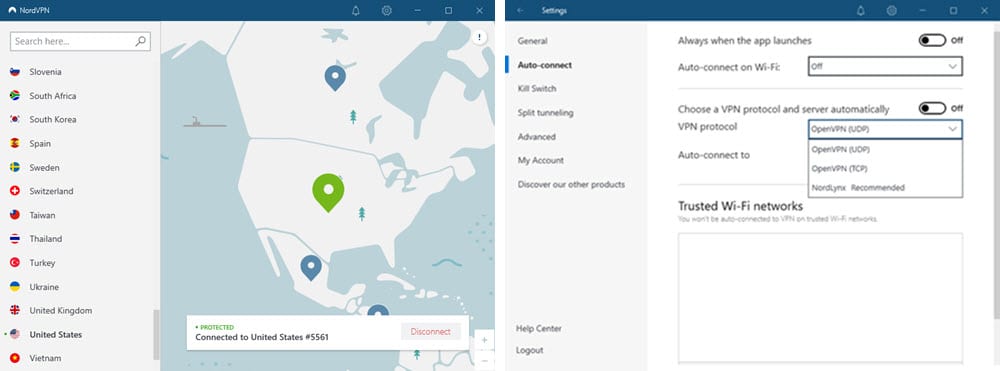
If you have looked at VPNs lately, you may have noticed that a few have added support for the WireGuard protocol. The creators of WireGuard tout it as the “next-generation” of VPN encryption. That is because it provides better performance than the current gold standard, the OpenVPN protocol. There are several key differences between the two protocols and we’ll compare them at length. We’ll also test some of the top VPN services so you can see the speed difference when using WireGuard vs OpenVPN.
About WireGuard


The creators of WireGuard aim to provide a simple and effective VPN implementation. Their goal was to take popular VPN technologies and fix the issues that plague their setups. Though OpenVPN has improved since that time, it still has issues with a complex setup, disconnects, slow re-connection times, and more. In comparison, the coding for WireGuard is around 4k lines of Kernel code (it uses Linux and works in the Kernel space). It offers the state of the art encryption methods such as ChaCha20 for symmetric encryption with Poly1305 for message authentication. The combination makes it faster, easier to audit than the OpenVPN alternatives, and not so resource-intensive. It offers higher speeds, easy setups, and very quick re-connects.
WireGuard was not initially designed with privacy in mind. Since WireGuard assigns the same IP address each time you use it, it has to keep a record of your IP and connection times by default. That said, a few companies offer their own versions of WireGuard. By doing so, they have solved the security issues with the protocol. That means it is possible to have the speed advantages and use it securely.
About OpenVPN


OpenVPN is a VPN protocol that came out in 2001. It uses techniques to create secure point-to-point or site-to-site connections. The protocol is open-source and uses 256-bit AES military-grade encryption and others. Through the use of the OpenSSL encryption library and the TLS protocol, it contains many security and control features. It was designed with security in mind, has been independently audited, and does not keep logs by default. With OpenVPN, you can switch ports to help mask activities.
However, OpenVPN has some issues. On average, it uses anywhere between 400,000 to more than 600,000 lines of code. All those lines of code provide more chances to find and exploit flaws in the system. While it is secure, that can also cause performance issues. Many companies use kill switches to protect the user when the VPN connection drops. Because of the slowness of reconnecting with OpenVPN, using a kill switch is important to protect yourself. Encryption overhead is common as OpenVPN uses older methods. It works in the userspace, so it can be resource-heavy and cause quite a bit of speed loss.
WireGuard vs OpenVPN – Performance
After looking at the last two sections, you can see that WireGuard should be a clear winner. Now, let’s see how WireGuard performs on a speed test vs. OpenVPN. Here are the results for NordVPN. WireGuard was up to 30% faster in our testing.


| Server Location | WireGuard (Mbps) | OpenVPN (Mbps) | Performance Difference |
|---|---|---|---|
| New York | 357.36 | 287.04 | 20% |
| Chicago | 339.03 | 269.70 | 20% |
| Los Angeles | 369.92 | 251.35 | 32% |
| London | 288.11 | 199.68 | 31% |
| Amsterdam | 233.79 | 211.34 | 10% |
| Hong Kong | 229.14 | 163.59 | 29% |
| Sydney | 227.58 | 208.12 | 9% |
As you can see, we tested NordVPN servers in a number of locations. WireGuard performance between 8% and 32% faster than OpenVPN when testing to the same servers. This was not true of every VPN provider we tested. For now we would recommend using NordVPN as they appear to be making full use of the advantages of WireGuard.
Here are a few of our favorite VPNs that use WireGuard. We tested the top 3 and NordVPN had the best performance.
| Rank | VPN Service | Our Score | Server Locations | Visit |
|---|---|---|---|---|
| 1 |   | 9.8 | 87 |   |
| 2 |   | 9.4 | 95 |   |
| 3 |   | 9.0 | 46 |   |
| 4 |   | 8.8 | 68 |   |
| 5 |   | 8.6 | 80 |   |
WireGuard vs OpenVPN – Conclusion
In conclusion, WireGuard is a newer and better protocol for those seeking the best speeds. If you’re primary focus is privacy, then we still recommend using OpenVPN. With that said, there are very few reasons not to use WireGuard as long as you trust the provider that is offering it. In our research we found that NordVPN and Mullvad have come up with workarounds so that they do not have to log users IP address. We like the fact that WireGuard is lightweight and easy to use. Do not be surprised if you see more providers offer it in the future. As long as the provider does not keep logs, we recommend using WireGuard vs OpenVPN for the best performance.
